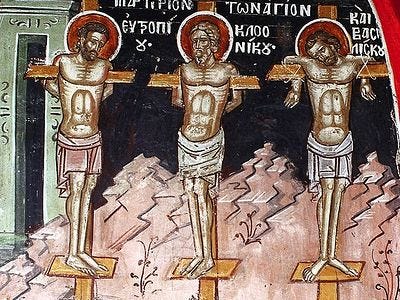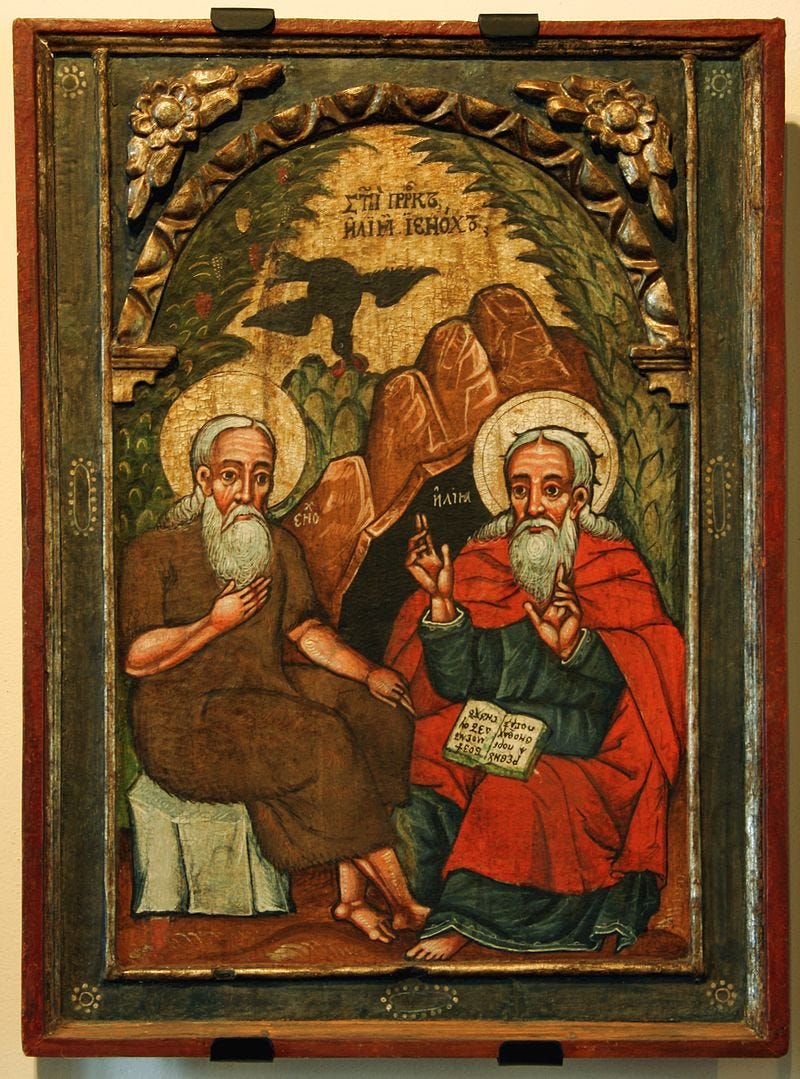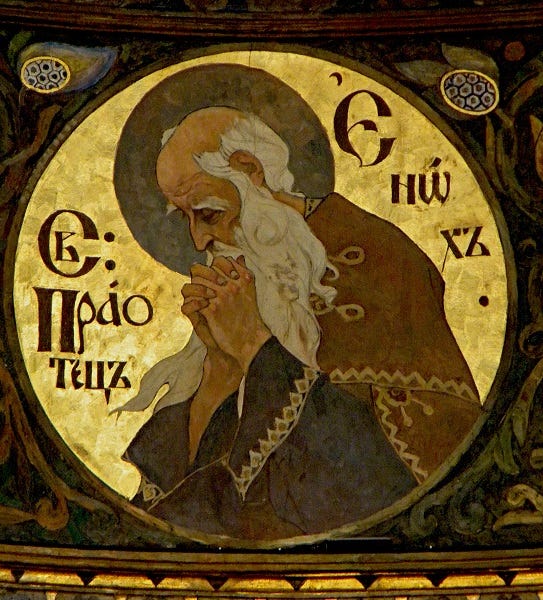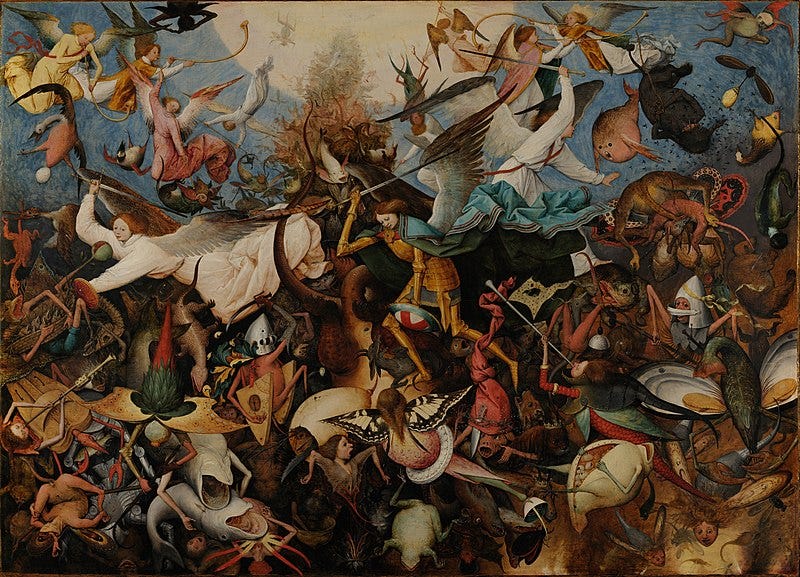Daily Readings | 3 March 25 | First Day of the Great Fast | Enoch in Jude 14–16
Scripture Readings Gen 1:1–13; Prov 1:1–20
Saint/Feast Day: First Day of the Great Fast; Saints Eutropios, Cleonicos, and Basiliscos
In the reign of Maximian and Maximin, a persecution raged against the Church. In Amasea many were arrested, including St. Theodore the Recruit. Theodore’s relative, Basiliscus, was among those arrested and imprisoned, along with two of Basiliscus’ close friends, Eutropius and Cleonicus, who were brothers. They were the closest of friends and said they would stand firm together for Christ. The three declared themselves as inseparable in faith and love as the Holy Trinity were inseparable One from Another. When Eutropius and Cleonicus were martyred, Basiliscus feared he would not have the courage to go it alone and he prayed, “O Lord Jesus Christ, remember me, even to the end, that I may not be separated from these holy men who have been taken from me and who now are crowned!” The time came for Basiliscus to appear before the governor. He too refused to offer sacrifice to the gods and, after suffering terribly, was also martyred by beheading and so joined his friends in the heavenly Kingdom. This happened in 308.
L. Farley, Eastern Saints.
Readings: Gen 1:1–13; Prov 1:1–20
For the next number of weeks, the Byzantine readings are from Genesis and Proverbs. Since this is a New Testament studies SubStack, I will be transitioning to the Roman readings since there will always be a NT/Gospel reading (see the USCCB daily readings page)—that is, once I am done with Jude. I think this is a good place to continue since I have accidently started to write a mini commentary on the epistle.
I will, on occasion, comment still on the Byzantine readings as appropriate or as I feel inspired. Like today, consider Prov 1:10–11, 15–16
|10| My son, if sinners entice you,/ do not consent.// |11| If they say, “Come with us, let us lie in wait for blood,/ let us wantonly ambush the innocent…
|15| my son, do not walk in the way with them,/ hold back your foot from their paths;// |16| for their feet run to evil,/ and they make haste to shed blood.
Although we cannot prove that this was on Jude’s mind when composing the epistle, this passage is apropos considering his warnings against the “godless” people in the community who attempted to lead others astray.
It is best to avoid bad fruit, for they will inevitable spoil the bunch.
- -
Now, as for today, we will continue our examination of Jude, specifically Jude 14–16 where he quotes from 1 Enoch.
|14| It was of these also that Enoch in the seventh generation from Adam prophesied, saying,
“Behold, the Lord came with his holy myriads, |15| to execute judgment on all, and to convict all the ungodly of all their deeds of ungodliness which they have committed in such an ungodly way, and of all the harsh things which ungodly sinners have spoken against him.”
|16| These are grumblers, malcontents, following their own passions, loud-mouthed boasters, flattering people to gain advantage. (RSV)
Is 1 Enoch Canon?
The use of 1 Enoch in Jude is a complicated matter. Is 1 Enoch canon? Well, for most of Christianity, no. The Ethiopian Orthodox Church has it as part of their inspired works, and this is in part because the text is preserved in Classical Ethiopic (or, Ge’ez). So, too, Jubilees is part of their canon, and it also survives in Classical Ethiopic. This is not a reason why, but Ethiopian Christians thought the texts were important, and so they continued to copy them and use them.
For 1c. Jews, though, would 1 Enoch be considered canon as, say, the Torah or the prophets? Probably not. But, it is important to note, that Judaism had not fully established their canon, nor had Christians, by the time Jude was writing this letter.
As such, we have to tread carefully about how we discuss what is “inspired” or “Scripture” when discussing the NT. This is a topic for a later time (see Metzger, The Canon of the New Testament: Its Origin, Development, and Significance), but it is important to note that these texts were circulated and read.
Bauckham, 2 Peter, Jude, 96, astutely notes on the use of “prophesied” and Enoch,
Ἐπφοψήτευσεν, “prophesied.” While this word indicates that Jude regarded the prophecies in 1 Enoch as inspired by God, it need not imply that he regarded the book as canonical Scripture. At Qumran, for example, the Enoch literature and other apocryphal works were evidently valued without being included in the canon of Scripture.
Even if 1 Enoch was not considered as canonical as Genesis or Isaiah, that does not mean it was not influential for early Christians. Jude in particular relies heavily on the document, as I have noted in past Daily Readings. If you peruse Bauckham’s commentary, he makes frequent notes on parallels with Jude and 1 Enoch. Regardless of the book’s status “officially,”—to use a loose term—the epistle writer felt comfortable quoting it directly in his letter.
The Quotation of 1 Enoch 1:9
I marked the text from 1 Enoch in the block quotation above to make it clear what is from Jude and what is Enoch. There is some difficulty here, though, since the Greek of 1 Enoch has not been completely preserved like the Ge’ez—as I said previously.
As such, what we do possess to compare differs slightly:

Nota Bene: This comparison was done rather hastily, so the translations provided are more to show congruencies and divergences. I am not necessarily married to the precision of the translations—they are quite literal, syntactically rigid, and lexically uncritical—since I am focusing on comparing the texts of Jude and the surviving Greek of 1 Enoch 1:9.
As for the most complete witness of the text, 1 Enoch 1:9 (Ethiopic) reads,
Look, he comes with the myriads of his holy ones,/ to execute judgment on all,/ and to destroy all the wicked,/ and to convict all humanity/ for all the wicked deeds that they have done, and the proud and hard words that wicked sinners spoke against him. (translations of 1 Enoch [Ethiopic] come from G. Nickelsburg & J. VanderKam, 1 Enoch, 20)
Jude’s version is slightly different, which may attest to a different textual tradition, or the author forgot the particulars, and the divergences is from a shaky memory—or, this was a deliberate alteration.
What is critical to note: the quotation is intended to speak about the Lord coming to judge the godless.
The Meaning of 1 Enoch 1:9 in Jude 14–15
It might be best to start with the context of 1 Enoch 1:9 since most have not read the full text—with this book being part of the Old Testament Pseudepigrapha, most would consider it useless for understanding Christianity. That said, this work in particular was of unique interest to Jude.
The beginning of 1 Enoch starts with an oracle of judgment. This judgment is directed towards all of humanity just prior to the flood—that is, the one of Noah (Genesis 6–9).
So, the basic structure of the start of 1 Enoch that is relevant for us:
Oracle of Judgment (1.1–9)
The Indictment of the Ungodly (2.1–5.4)
Verdict against the Ungodly (5.5–9)
The Rebellion of the Watchers (chapters 6–11)
The “Watchers” is a more complicated topic, but it refers to those fallen angels who rebelled against God. So, this condemnation, is against them and those humans that follow in their path—for these are the ones who brought about strife and war (1 Enoch 8.1–21), etc.
The importance of 1 Enoch can also be seen in 2.1, which resonates with Jude 13 concerning wandering stars:
Contemplate all (his) works, and observe the works of heaven (τὰ ἔργα ἐν τῷ οὐρανῷ), how they do not alter their paths; and the luminaries <of> heaven (τοὺς φωστῆρας τοὺς ἐν τῷ οὐρανῷ), that they all rise and set, each one ordered in its appointed time; and they appear on their feasts and do not transgress their own appointed order (τὴν ἰδίαν τάξιν).
Although the lexical connections with Jude are lacking, the same idea resonates. The stars in Jude 13 do not stay on their path as they should, whereas the luminaries of heaven should remain on their path as they have been ordered. There, too, is a discussion of clouds raining upon the earth (2.3), fruitful trees (5.1), and the sea and rivers having their own intended works (5.3)—all have their parallel in Jude as we discussed previously.
As for our quotation in Jude 14–15, the use here is apparent if you recall the beginning of the epistle. Jude specifically calls labels these infiltrators as “godless” for rejecting God:
For admission has been secretly gained by some who long ago were designated for this condemnation, ungodly persons (ἀσεβεῖς) who pervert the grace of our God into licentiousness and deny our only Master and Lord, Jesus Christ. (Jude 4)
The repeated use of “ungodly” in 1 Enoch reveals why Jude chose to employ this verse in his line of argument. As he did concerning other accounts of Jewish history of disobedience resulting in judgment and condemnation, so here, too, Jude has compared these “godless” infiltrators to the Watchers and corrupt humans in Enoch.
Their squandering of the Grace from God and the renouncement of Jesus as Lord—those “harsh sounds”—are further condemned in Jude 16,
These are grumblers, malcontents, following their own passions, loud-mouthed boasters, flattering people to gain advantage.
The “ungodly sinners” of 1 Enoch 1:9 who spoke against God are the same here—according to Jude—who have attempted to deceive the faithful.
The list of Jewish instances of condemnation has been growing throughout the text:
The Exodus and destruction of those who doubted
The Fall of Angels, bound in “eternal chains in the nether gloom”
Sodom and Gomorrah, “undergoing a punishment of eternal fire”
The dispute between Michael and the Devil over Moses’ body
Walking in the “Way of Cain”
Balaam’s Error
They shall perish in “Korah’s Rebellion”
The condemnation of the Watchers
All of these references are due to some form of rebellion, misleading the faithful, or sin; all of which resulted in judgment and condemnation. So, it is fair to say, that Jude is chastising those who forsake their gift from God by rejecting the Christ. The result will be judgment.
This should be a warning to us all to be sure to preserve our communities as best we can. It should ever be our goal to help foster the faith in others rather than attempt to deceive and mislead them. Worst of all, to cause another to sin or fall away is despicable and worthy of judgment.
If you have enjoyed this brief reflection on today’s readings and wish to read more about NT studies, would you kindly like, share this post, and subscribe.
“|1| Asael taught men to make swords of iron and weapon and shields and breastplates and every instrument of war.// He showed them metals of the earth and how they should work god to fashion it suitably, and concerning silver, to fashion it for bracelets and ornaments for women. And he showed them concerning antimony and eye paint and all manner of previous stones and dyes.// And the sons of men made them for themselves and for their daughters, and they transgressed and led the holy ones astray. |2| And there was much godlessness on the earth, and they made their ways desolate.”









